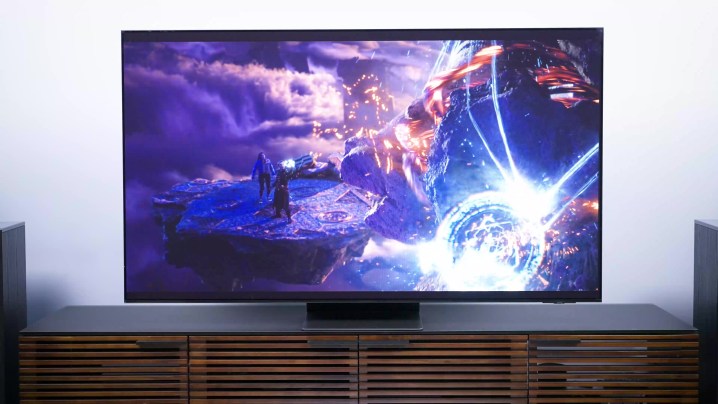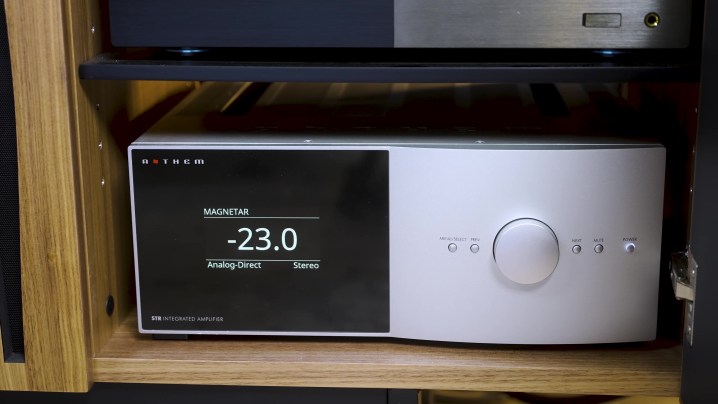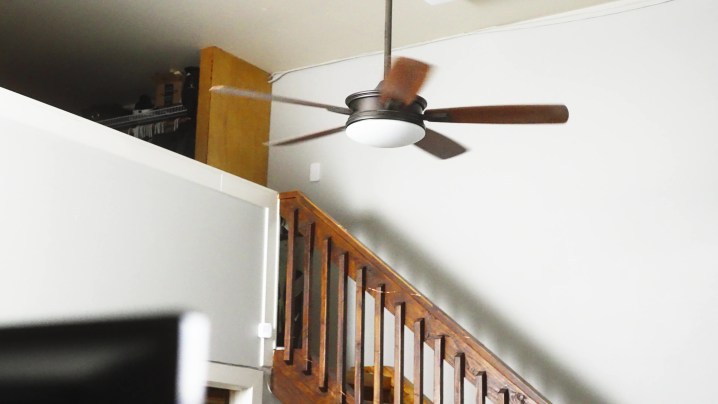
On this week’s You Asked: Is Amazon trying to kill Blu-ray discs? Are the Sony XM6 headphones coming? (And should you wait for them?) And can a ceiling fan alter your Dolby Atmos audio?
Where art thou Blu-ray?

Brandon Baecker notes that Amazon still sells Blu-ray discs, but claims that Amazon is deliberately hiding them from us. He cites an example from experience, suggesting that we type “True Lies 4K Blu-ray” in the Amazon search bar to see for ourselves that the results turn up nothing but a Prime Video link and a bunch of unrelated items. He also says the only way he could find it on Amazon was to search Google or follow a Blu-ray.com link. Brandon notes it seems its been this way since Best Buy stopped selling discs.
Your mileage may vary as search results aren’t always the same from one of us to the next. (, if you want.) But I agree that getting to Blu-rays and DVDs on Amazon is not as intuitive as you’d think. However, I’d stop short of suggesting that Amazon is trying to kill physical media, and I don’t think that Best Buy halting disc sales is related because I’ve found Amazon’s own site-search engine to be a real pain in the neck for years.
I think there are a few factors at play here. One is that Amazon’s site-search tool is just not as good as Google. You could argue it should be considering Amazon runs its own airline and trucking companies, and it’s got boatloads of cash and developer talent. But I digress.
Also, I don’t think Amazon stands to gain a whole lot by selling fewer discs. Sure, there’s a chance that it makes a bit more margin on a $20 digital sale than it does on this $25 disc it has to ship, but I think the fact that we sometimes see more Prime Video links than we do discs has more to do with the fact that (presently anyway), way, way, way more people are streaming than buying discs. It’s basic supply and demand.
I don’t think there’s a conspiracy going on here. But I appreciate you pointing this challenge out because it prompts me to show folks who do want to find the right disc version that they can save a bunch of time and headaches by clicking twice to narrow the search to the correct product type.
Waiting on the XM6 …

Alex Fringe wants comfortable wireless headphones with ANC and was looking at the Sony XM5, but is wondering about the rumored Sony XM6 and whether they might be worth waiting for.
I don’t know how much longer you’d be willing to wait to buy your headphones, but historically, the Sony WH-XM series headphones — those are the over-ear models, as opposed to the WF-XM series, which are the in-ear version — have been released in the fall, right around September. (In fact, I think I reviewed the first pair in Germany around the IFA show.)
So, if Sony sticks to that release window, then you could be looking at up to five months until the XM6 are released. And that’s if they really are a thing. But I think they will be. Sony’s on a roll with these headphones, and I’d be shocked if they weren’t real. Plus, some of the leaks look pretty legit. And we’ve already published our wish list of things we’d like to see in the XM6.
Is it worth waiting? Hard to say. The XM5 were slightly better than the XM4. But when the XM5 came out, I did say getting the XM4 was a smarter move since they went down by $50 when the XM5 debuted. I expect the same to happen this fall. When the XM6 come out, the XM5 should be discounted, too.
So, if you want the latest and greatest, or if you want to save $50 to get an absolutely stellar pair of headphones, you’ll need to wait four or five months. Otherwise, get the XM5 now. It’s about your finances and your ability to be patient. Choose accordingly.
Dolby Vision vs. HDR10+

Gabe Hartzler wrote in with some very kind words for the channel and asked if all of one’s equipment needs to be Dolby Vision-capable to see content in Dolby Vision. He then goes on to ask if there’s truly a difference between HDR10+ and Dolby Vision that an average person could see without a side-by-side comparison.
Yes. Full stop. Everything — from the source material, to the source device, to the display device, and everything in between — needs to support Dolby Vision in order for you to see anything in Dolby Vision. That means that the show or movie you stream needs to be available in Dolby Vision. The device you use to stream or the player you use to play the disc needs to support Dolby Vision. The receiver you pass the signal through (if you do that) needs to be able to pass Dolby Vision. And the TV or projector you use needs to have Dolby Vision.
The whole point of Dolby Vision is that it is an end-to-end solution that is scalable to the capability of your devices.
Now, is there a recognizable difference between HDR 10+ and Dolby Vision to the average person? I would say, in most cases, the answer there is no. But there are a lot of variables to consider, not the least of which is that there are far more titles available in Dolby Vision than there are in HDR 10+.
Really, though, the dirty little secret about Dolby Vision is that it is not being used to anything close to resembling its full potential, and that’s actually on creators.
Does a bigger TV need bigger sound?

Ian Cox just moved to a new place and upgraded to a bigger TV since he is sitting further away. (You don’t have to justify to me why you got a new TV, just saying.) And now that they have an awesome Samsung S90C QD-OLED, they are thinking about upgrading their A/V receiver. Ian is currently rocking a Panasonic SA-HE100 and is wondering what to look for in an A/V receiver.
First off, Ian: That receiver you have is a real blast from the past for me. I used to sell that model, and I think it is over 20 years old now. Way to keep that thing ticking.
The good news is that whatever it is you are playing on your Xbox Series X or PlayStation 5, the best audio format is all but guaranteed to be supported by nearly any A/V receiver you buy. That’s the least of your concerns. Since you are gaming, I recommend you use the eARC port on your TV to dump the audio signal down to the receiver. I think you need an A/V receiver that supports HDMI 2.1 with eARC, and there are a good number of those available now. Just make sure the receiver ticks that box.
Next, I suppose you should be thinking about how you may want to expand your speaker system. I would probably look at getting an A/V receiver that supports 7.1 channels (or at least 5.1.2) so you could get two Atmos channels. If you think you might get real hardcore about the surround later, then you’ll want support for more channels.
As for power ratings, it kind of depends on the brand. I’ll take 70 watts of Anthem’s power over Pioneer’s 100 watts of power, for example.
As for brands. I like Yamaha, Marantz, and Onkyo. Sony is making good receivers these days. There’s Anthem, of course, and then there are boutique brands like Emotiva that you could look at, too. Or more specialty brands like NAD and Cambridge. Denon is … fine; the same company owns them and Marantz. I just prefer Marantz’s vibes.
That’s about all I can tell you without knowing a whole lot more about your space and the speakers you use now or the speakers you may use later. But I do hope I’ve relieved some concern about support for surround formats since that seemed to be your primary concern.
This ain’t Texas …

Harriet Delphi Green lives in Texas, where it is hot. And thus they have the ceiling fan in their living room running 75% of the time. They are concerned about how that might affect the ceiling-reflected sound that would come from the upfiring speakers in a Dolby Atmos soundbar system like the Samsung Q900C. And this is my favorite part — Harriet mentions the memories of standing in front of an oscillating fan and hearing their voice come out like a “robot,” which really got them thinking about this.
I love this question for so many reasons. I grew up in Texas, and I know what you mean about the heat and the constantly running ceiling fan. And I did the same thing with speaking into a fan as a kid. I found the old box fans did the best job of warbling my voice, and to this day, I find it hard to resist going up to one and just going “ahhhhhhhhhhh.”
But mostly I love this question because it really got me thinking about your situation. I’ve had questions about vaulted ceilings, popcorn ceilings, super-high ceilings, and even ceilings with skylights, or obstacles like beams crossing overhead. But this is the first fan-related question!
I’ll tell you right now that I don’t know how your fan might affect the sound. There are just too many variables I can’t take into account.
We know that any sound interacting with those moving blades will be altered. But I don’t know how noticeable that alteration might be. With our setup, I have one speaker shooting right up into that fan. I suspect that any sound coming from this upfiring driver, directly below the fan, would be the most altered on the way back down. But I don’t know how noticeable it would be. All the other upfiring drivers in this system are bouncing sound off the ceiling, and would have minimal interaction with the fan blades themselves. So then the question becomes, how much would the motion of the air created by the fan affect our perception of the sound.
I suspect not much, but I don’t know that for certain.
I do believe that the closer the sound source is to the blades and the closer the listener is to the blades, the higher the likelihood that the effect from the fan blades would be audible. But it’s hard to imagine your ceiling fan reducing the pressure level of any sound coming back at you from the ceiling. I don’t think it would significantly delay the arrival of the sound. At worst, it might modulate the sound. But it is just so hard to imagine it having that serious an impact.



